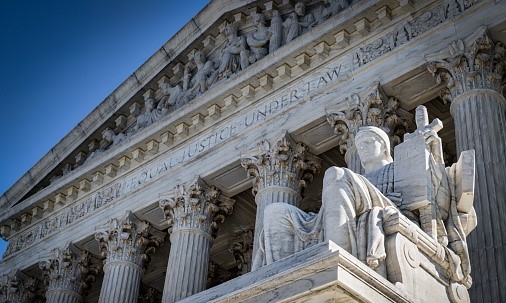You have /5 articles left.
Sign up for a free account or log in.

Bill Chizek/Getty Images
The Supreme Court today agreed to hear an appeal of a decision that Harvard University’s use of affirmative action in college admissions is legal. The court will also hear an appeal of a ruling that the University of North Carolina at Chapel Hill’s use of affirmative action was legal.
The court said it was consolidating the cases and would hear them in a total of one hour.
The decision to hear the cases represents a chance for opponents of affirmative action to reverse not only the Harvard and UNC decisions but many others that have upheld the use of affirmative action since the Supreme Court ruled in the Bakke case in 1978. The decision comes at a time when the composition of the Supreme Court differs significantly from the last time it upheld the use of affirmative action in college admissions, in 2016, in a case involving the University of Texas at Austin.
That decision was 4-to-3 because of the death of Justice Antonin Scalia, an opponent of affirmative action, and the recusal of Justice Elena Kagan, who worked on the case as solicitor general before she joined the Supreme Court. The author of the decision, Justice Anthony M. Kennedy, has since retired from the Supreme Court.
The three justices who were in the minority in that case—Chief Justice John Roberts, Justice Samuel Alito Jr. and Justice Clarence Thomas—remain on the court, and they have been joined by three conservative justices.
The Harvard case decisions—in 2019 by Judge Allison Burroughs and in 2020 by the U.S. Court of Appeals for the First Circuit—came in a much-watched case brought by a long-standing critic of affirmative action on behalf of a group of Asian American plaintiffs.
“For purposes of this case, at least for now, ensuring diversity at Harvard relies, in part, on race conscious admissions,” Burroughs wrote in her conclusion. “Harvard’s admission program passes constitutional muster in that it satisfies the dictates of strict scrutiny. The students who are admitted to Harvard and choose to attend will live and learn surrounded by all sorts of people, with all sorts of experiences, beliefs and talents. They will have the opportunity to know and understand one another beyond race, as whole individuals with unique histories and experiences.
“It is this, at Harvard and elsewhere that will move us, one day, to the point where we see that race is a fact, but not the defining fact and not the fact that tells us what is important, but we are not there yet. Until we are, race conscious admissions programs that survive strict scrutiny will have an important place in society and help ensure that colleges and universities can offer a diverse atmosphere that fosters learning, improves scholarship, and encourages mutual respect and understanding.”
The appeals court said, “The issue before us is whether Harvard’s limited use of race in its admissions process in order to achieve diversity in the period in question is consistent with the requirements of Supreme Court precedent. There was no error.”
Students for Fair Admissions, the group that sued Harvard, in February asked the Supreme Court to hear the case. The brief asked the Supreme Court to repeal its 2003 decision in Grutter v. Bollinger, which upheld the use of affirmative action in admissions by the law school at the University of Michigan. “Although Grutter praised the ‘educational benefits’ of student body diversity writ large, its assumption that a university can predict, based solely on race, an applicant’s ‘views’ or ‘experience[s]’ is little more than racial stereotyping.”
With regard to Harvard, the Students for Fair Admissions brief said, “At Harvard, race is not a ‘plus’ that is always ‘beneficial’; it’s a minus for Asian Americans. At Harvard, race is not a ‘factor of a factor of a factor’; it is an anvil on the scale that dominates the entire process. At Harvard, race is not a ‘temporary’ evil to be repealed as soon as possible; it is a key aspect of identity that Harvard will use until a court makes it stop.”
Harvard filed a brief with the Supreme Court in May, urging it not to take the case.
“Students for Fair Admissions’ petition recycles allegations both courts rejected and offers a thoroughly distorted presentation of the record,” the brief says.
“SFFA tries to sidestep the lower courts’ findings by proffering its own version of the record and urging this court to conclude for itself that Harvard pays excessive attention to race and intentionally disadvantages Asian American applicants. But SFFA’s unreliable portrayal of the facts fatally undermines its case for review,” says the Harvard brief.
Harvard’s admissions policies are of course, in some ways, unusual in American higher education. The university receives many, many more applications than it can admit—even if most of the applicants could do the work at Harvard. But the case will likely affect all of higher education, even colleges that are not competitive in admissions. Many colleges award some of their aid based on race or ethnicity or have summer programs for talented minority youth. These programs could face more scrutiny than they have if the Supreme Court rules against Harvard.
The Supreme Court was originally expected to decide whether to take the case in June, but the court asked the U.S. solicitor general to weigh in. She did so last week, backing Harvard and discouraging the Supreme Court from taking the case.
The UNC case is a late addition.
The University of North Carolina at Chapel Hill has asked the U.S. Supreme Court not to consider an appeal of a lower court’s ruling that the UNC affirmative action program is legal.
UNC won the case when Judge Loretta C. Biggs found that “at trial, UNC defendants produced substantial, credible, and largely uncontested evidence that it has made the deliberate decision to pursue the educational benefits that flow from student body diversity; has offered a principled, reasoned explanation for this decision; and that the benefits the university seeks to achieve are sufficiently measurable to permit judicial scrutiny.”
Normally, the plaintiffs in the case, Students for Fair Admissions, would appeal to the U.S. Court of the Appeals for the Fourth Circuit. But SFFA said that, given the similarities to the Harvard case, the Supreme Court should combine the two cases.








